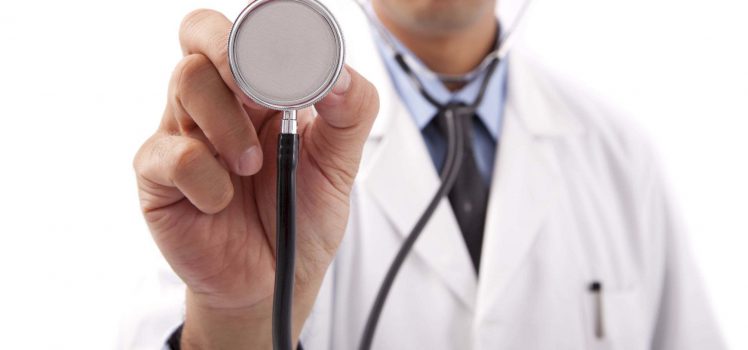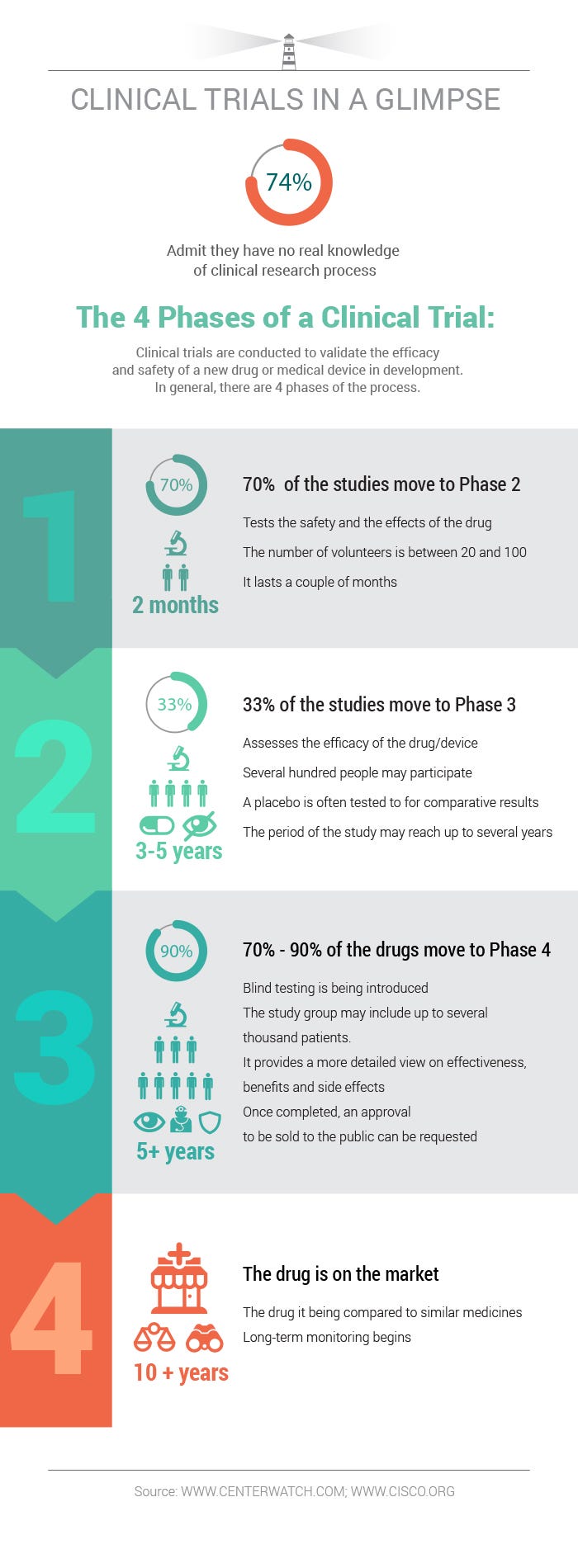Clinical Trials: A Patient or Not, You Need to Know This (Infographic)

The Internet is full of articles about miraculous medical treatments, homeopathy and cures based on positive thinking and the power of the human mind. Few of them might be reasonable, others are obviously misleading, and some are even dangerous.
It is an undeniable fact that medical progress is what has been and probably will always be the way to finding real, effective, and proven cures. As one of the most famous U.S. scientists Carl Sagan says, “Advances in agriculture and medicine have saved vastly more lives than have been lost in all the wars in history”. What he misses to mention is that the progress in medicine comes mainly from standing on the shoulders of volunteers and patients.
Volunteers and patients are indeed crucial when it comes to testing a drug or a medical device under development. Of course, doctors, researches, Clinical Trials sponsors are the initiators of every trial, but they would hardly get far without the patients.
So, putting patients at the center is vital not only for the industry, but for the medical advancement and the human future as a whole. One of the ways to empower patients is to give them the means to learn all of their options, all of the benefits and risks, all of their rights, to offer them the power to search, to make them able to choose when and how they will contribute to a given study or not.
This includes access to knowledge and data about Clinical Trials.
Here are some basic facts that anyone, no matter willing to participate in a trial or not, deserves to have a grasp of.
There are more than 200 000 public clinical trials in 192 countries around the globe. 37 451 of them are currently recruiting participants. The overall success rate is about 16% according to a recent study (it varies depending on the condition of interest).
Clinical Trials are tests of innovative treatments under development conducted to collect data regarding the safety and efficacy of a new drug or a device development. There are a several steps of approval before the drug or device reaches the consumer market.
Before getting to actual people, the testing starts with extensive laboratory research which might last years of experiments. If this laboratory research is successful, researches send the data to the Food and Drug Administration (FDA for The U.S.) for approval to continue research and testing in humans.
Once approved, the drug/medical device typically goes through 4 phases. Each phase must be successful and show positive results in irder for the study to move to the next step.
The following infographic explains each of the 4 phases:

As it is visible, a phase can last between 2 months and 10 years. Most of the drugs under research fail on phase 2 which appears to be the most critical. The 3rd and the 4th phases are the ones with the highest number of participants, respectively — with the highest hopes for success.
Given the fact that only 5% of the world population participates in Clinical Trials, we can easily judge how challenging is to develop a new drug no matter the rapid general progress in science and technologies. A simple Google search will also display pretty vividly some of the reasons for the public controversial opinion on Clinical Trials.
Clinical Trials come along with a number of benefits, but also risks. A trial can open a door to a inaccessible treatment and spare lives. It can bring unwanted side effects too. The largest Clinical Trials register in the world, www.clinicaltrials.gov, describes a couple of potential benefits and risks of joining a trial:
Benefits:
– Access to promising new treatments
– Treatment that may be more effective than the standard approach
– Close monitoring, advice, care, and support by a team of doctors
– The opportunity to be the first to benefit from a new method
– The chance to play an active role in your own healthcare
– The chance to help society
Risks:
– More time required than a non-clinical trial treatment (more visits to the clinical trial site, more treatments, hospital stays, etc.)
– Possible unpleasant and sometimes dangerous side effects
The decision of participating in a Clinical Trial is a serious one. But every decision begins with the awareness that such can be made, that this option exists, that an alternative might be out there. Most of the times patients get access to information about Clinical Trials from their doctors or by recruiting companies. The problem is that not all of the doctors know about all of the treatments in development available. Likewise, most of the recruiting companies work in a very specific areas of expertise and do not reach all the patients interested in a trial.
Leaving all said aside for a moment, another obstacle should be taken under the spot light. Even when patients are proactive and learn by their own about trials оr visit the public registers, the chance of finding what they need is not so high. One of the reasons is that the language used and the way of displaying Clinical Trials information are way too scientific even for the biggest enthusiasts.
All modern search results need to be customized, easy to scan and comparable. This is the mission of FindMeCure as well — to provide such tool to the millions of people willing to consider joining a trial.
FindMeCure aims to become a platform that can offer all the important data digested and visualized, so that everyone interested can find and choose the most relevant Clinical Trials for them. It is not an easy task, but far not impossible either.


[…] Clinical Trials: A patient or Not, You Need to Know This (Infographic) […]
Thanks for your explanation on “How clinical trials work”. I am interested in participation as a healthy volunteer, 54yr old male, non-smoker, non-alcoholic, 180cm tall, weight: 82Kg, sporty and not taking any legal or illegal drugs.
My aim is to contribute to innovative development of new efficient drugs for any type of diseases, specially that my sister had lung cancer, but was healed with help of modern technology and medical advancement.
I also need a “Paid Break” from my job, which doesn’t give me the time for my paperwork and study as well as hobbies. This means, I can accept participating in clinical trials that compensate me for my time.
We’re trying to make some medical treatments that we plan to launch into the market. I think I’ll pay a clinical research team to test the drugs for us. Thanks for adding that it’s vital for our industry to have this, so I hope that we can find some good ones.
I have been diagnosed by my neurologist that I have PSP, What I can tell is something is wrong because my balance is off, Also my speech is very hard to understand but not all the time. Any way I can give you more if you need it.